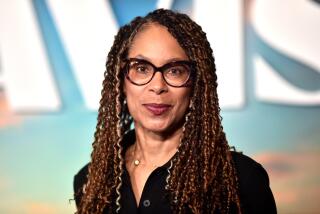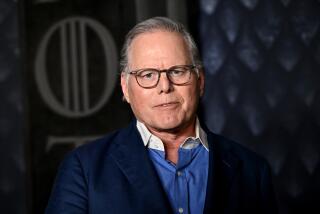Britain’s Venerable ‘Auntie’ Needs a Face Lift
LONDON — The British Broadcasting Corp. has for much of its history been known affectionately as “Auntie.” But in the year that BBC Television celebrates 60 years of public broadcasting, the cozy nickname suddenly no longer seems to fit quite so neatly.
Attempts by the Beeb (as it is also called) to behave more like a commercial business than a public service have met with fierce criticism. Widespread cost cutting and layoffs have resulted in low employee morale even as the corporation faces rising competition from digital television services.
*
Rupert Murdoch’s BSkyB launches a service next year and is way ahead of the BBC in developing its own “set-top box” to convert the digital information for individual viewers. Since the market is unlikely to accept two types of boxes, the terrestrial broadcasters--the BBC channels and independent broadcasters--may arrive on the scene too late with their own technology.
John Birt, the BBC’s director general since December 1992, is widely credited with forcing the BBC to shed its homely image and start thinking about profit margins and overseas markets. He has shaken up the production structure to bring together all BBC network radio and television departments, making it, according to the BBC, “the world’s biggest single radio and television powerhouse.”
BBC Production will produce nearly a billion dollars’ worth of radio and TV program each year for existing radio and television channels and develop programs for its new digital services. Multimedia departments will be based on brands covering such categories as natural history, drama and entertainment.
Until a few years ago, the BBC would have been unlikely ever to use the word “brand”--let alone consider exploiting one.
Chris Pye, soon to become head of commercial and business affairs, comes from a background in commercial TV and spent 15 years working in Hollywood making programs for U.S. networks. Unlike many executives at the BBC, he knows how to negotiate contracts with stars and understands the hard-headed world of rights and co-production.
*
Earlier this year, the BBC struck a $500-million deal with Discovery Communications in the U.S. and its sister company Flextech in Britain to launch pay TV channels on both sides of the Atlantic. The BBC is also discussing creating its own comedy and drama channel in the U.S.
The deal with Discovery, which is 49%-owned by Tele-Communications Inc., the largest U.S. cable operator, will create a joint venture to launch themed pay TV channels in North America and eventually other parts of the world. Discovery will fund the development of the channels, while the BBC’s contribution will be to open its archives to Discovery and to produce new programming.
Greg Moyer, Discovery’s president, says the deal reflects the changing philosophy at the BBC.
“The BBC has got some bumpy press lately over its inability to think entrepreneurially and aggressively,” Moyer said. “This organization is far ahead of most public broadcasters in the world in terms of anticipating a long-term marketplace.”
Birt, who joined the BBC from a commercial TV company, is constrained by a structure that has changed little since the BBC first became a nonprofit public corporation in January 1927. Its authority still comes from a Royal Charter that is renewed every 10 years--the last one was granted May 1--and it is still watched over by a board of governors accountable to Parliament and the public.
*
The BBC’s two television channels, BBC1 and BBC2, and its several national and regional radio stations are still funded by a TV license fee payable by every household with a TV set. The fee is currently about $150, and last year brought in about $3 billion.
Although it has so far managed to hold a 45% share of viewing and listening audiences (despite the emergence of 15 new commercial TV channels and 21 new radio services in its last financial year), the BBC is increasingly coming up against TV companies with much deeper pockets. Recently it lost out on the right to broadcast two big sporting events: soccer’s FA Cup and car racing’s Grand Prix.
Birt has pleaded with Virginia Bottomley, the government minister responsible for television, to increase the license fee above the rate of inflation, but this is unlikely. Instead he has had to look for other ways of making money and trimming costs.
More than 4,000 jobs have been cut in five years and the BBC has managed to save about $165 million each year for the last three, through what it describes as “better housekeeping.”
The director general is determined to boost earnings from the BBC’s commercial arm and formed BBC Worldwide two years ago to coordinate its approach to international and commercial activities, such as sales of videos such as the adaption of Jane Austen’s “Pride and Prejudice” and the Academy Award-winning animated adventures of “Wallace and Gromit.”
Sarah Frank, president and CEO of BBC Worldwide Americas, is in charge of a range of BBC interests in the U.S., from selling co-productions to video distribution and licensing and merchandising of characters.
“The U.S., being the biggest media market in the world, is enormously important to the BBC both in terms of selling individual program and in terms of the reach of its brand,” she says.
“Four generations of Americans have been fans of the BBC, beginning with World Service radio. My goal is to have a BBC product in every home in America . . . but you have to remember that British programming [in the U.S.] is niche programming. It’s not made for the masses, so our job is to make that slice of the pie as big as possible.”
The BBC first started selling programs to the U.S. in 1970 and comedy series such as “Keeping Up Appearances,” “One Foot in the Grave,” “Fawlty Towers” and “Absolutely Fabulous” have done well.
Frank believes the Discovery deal will help the BBC to increase its coverage.
“Our programs are the secret weapon for many of our clients, in the sense that we always get them great ratings and we also raise the average ratings. ‘Pride and Prejudice’ delivered A&E; the highest rating in its history.”
Discovery is considering launching three new themed channels with the BBC. The only one announced so far is “Animal Planet,” which will make use of BBC archives as well as producing new natural history shows. The second brand will be launched by the second quarter of next year in either Latin America or Europe and “Animal Planet” will probably have expanded into one of these two territories by the end of 1997. A third channel will be “incubated” on one of the existing channels by the end of next year, Discovery’s Moyer said.
*
While Discovery is carrying the brunt of the costs, Moyer says the BBC offers a rare combination of quality and quantity.
“Anybody serious about providing global channels that have nonfiction currently at their core has to be interested in the BBC. The BBC wasn’t necessarily clicked into any other major alliance, and they struck us as potentially needing a partner given the nature of their charter and their inability to go out and borrow money to channel into new businesses.
“I think the BBC finds us an attractive partner because we are based in the U.S. and we have the opportunity to give them some leverage. The crux of our deal is about launching channels with the rest of the world, so I think we’re both attracted to making sure we are building global businesses or global television franchises.”
Roger Luard, chief executive of Flextech, the British cable and satellite programmer, believes it was Discovery’s American pedigree that clinched the deal.
“Given the strength of TCI in the U.S. market--which is one the BBC has never really managed to crack--it was probably the best bet,” he said.
But low morale within the BBC and the threat of BSkyB on its own doorstep means Auntie’s challenges will be as much about keeping everyone at home happy as worrying about overseas alliances.
More to Read
The biggest entertainment stories
Get our big stories about Hollywood, film, television, music, arts, culture and more right in your inbox as soon as they publish.
You may occasionally receive promotional content from the Los Angeles Times.










